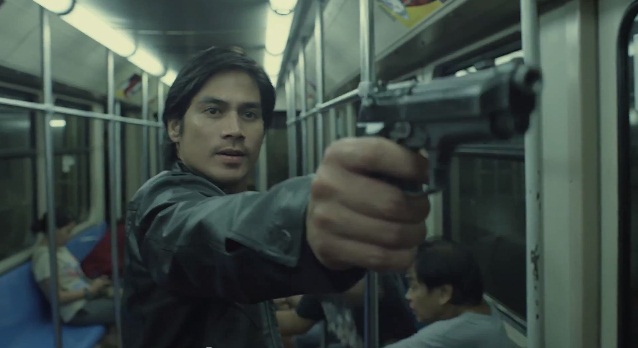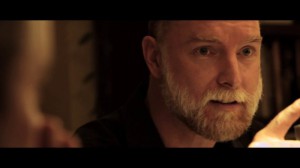Fantastic Fest kicked off its eight-day celebration of genre fare last night in style in Austin, Texas. This year’s festival has a new venue, the Alamo Drafthouse Lakeline, partly to show off the new digs and partly because the old ones at South Lamar are currently under a whole ton of construction. The opening night festivities were mostly centered around the marquee film playing at three of the Drafthouse screens: Robert Rodriguez’s new film Machete Kills, with Rodriguez, Danny Trejo, and Alexa Vega in attendance. Now, here’s the thing (and where this report, like the forthcoming ones, will diverge slightly from SoS fare): I didn’t get to see Machete Kills, in no small part because my desire to see it wasn’t exactly high. Yes, it’s one of the bigger events here, but I think an advantage to a festival like this one, as you’ll see from my daily reports as well as dedicated reviews (there will be a few here and there), is that you can discover a lot of unique, never-before-heard-of movies. So I can’t tell you that I saw Machete Kills. But I did see Danny Trejo. (Spoiler alert: he’s not a tall man. He’s still fierce-looking as hell. But he’s not a giant of a dude.)
Instead of Machete Kills, I began my first Fantastic Fest (and my first time in Austin, Texas, for that matter) with the low-budget sci-fi film Coherence. Writer-director James Ward Byrkit was in attendance for a film that Drafthouse founder and Fantastic Fest co-founder Tim League described, in his introduction, as being a perfect example of what the festival is all about. Coherence is the kind of movie that is best left unexplained; the less you know about the plot going in, the better, but here’s a morsel. The set-up is that eight friends–some married, some not–meet up for a dinner party on the same night that Miller’s Comet is passing over in the night sky. They chortle over some old wives’ tales about what strange occurrences past comets were blamed for. But then, the power goes out in the house, and when a couple of the dinner-party participants head out to check on other houses in the neighborhood, and suddenly, the rest of their evening is full of similarly odd happenings.
At first, depending on your level of genre love, Coherence will simply be enjoyable because, hey, look, Xander Harris is back! Yes, Nicholas Brendon of Buffy the Vampire Slayer plays one of the leads; in a clever bit of fun, his character, Mike, was a regular on another cult genre show of the late-1990s, Roswell. (The gag is compounded when he explains this to one of the people at the dinner party, who professes to have been a huge fan of the show despite not recognizing someone who starred in every episode.) Brendon isn’t the most important male character–or character, period–but for a while, he’s the funniest. On Buffy, he tended to be a teenage version of Chandler Bing, and he’s grown into adulthood similarly well. The movie around him is, for the most part, legitimately creepy and tense. Byrkit mentioned before the screening began that he shot the film partly as an experiment to see if shooting something in his living room could turn into a viable film, and that most of the dialogue was wholly improvised by the octet of actors. On the former point, while it’s sometimes a bit too obvious that locations were minimal–more than once, characters talk about something happening off-screen, but we are not privy to it–Coherence mostly doesn’t feel too cheap. Every so often, the nighttime shots become a bit too grainy; this is, honestly, a minor quibble. For a movie that was shot in pretty much one place, Coherence feels entirely lived-in and fully realized.
Where the movie stumbles, and only slightly, is in the details. What eventually unravels after the power goes out is extraordinarily complicated, and only a modicum of answers are forthcoming. Maybe we don’t need all the answers, but as Byrkit deliberately stacks up the sheer amount of–here comes a mild spoiler–alternate realities, it’s a bit too dizzying to take in without any closure. That said, the cast–also including indie director Lorene Scafaria as Brendon’s wife; and Emily Foxler as the ostensible lead, a sensitive dancer–sell the reality of the situation extremely well. And Byrkit should be commended for adding twist upon twist throughout. The only problem is that the follow-through sometimes is shaky or, at worst, nonexistent. These mild flaws aside, Coherence was a legitimately fine way to kick off the festival for me. Hopefully, the film will find some decent distribution on VOD in the months to come.
Next up (and last, because while I am still barely under 30, I am secretly a very old man who gets tired too easily), I sat down to watch On the Job, a Filipino crime drama with a novel concept that’s sadly inspired by true events. What if corrupt politicians hired prisoners to do their dirty work, let these hired guns out for a day to complete an assassination and then shuttle them back to a prison cell? Co-writer and director Erik Matti uses this setup as the starting point for his slightly overambitious crime epic. Here is a film whose aim exceeds its reach. On the Job wants desperately to be a high point in crime cinema, but can only settle for being a decent, if surprisingly grim, entry in the genre.
Joel Torre is Mario, also known as Tatang. He’s an old veteran of this twisted system, having spent over a decade in a Filipino jail while making a hefty amount of cash for these murderous day trips he’s hired for. As the film opens, he’s still training a younger, cockier inmate (Gerald Anderson); once he finds out that his parole has come through and, after he’s a free man, he won’t be able to have this high-paying gig anymore, he knows that young Daniel will have to take his place and be as thorough and unwavering as he is. In the meantime, an up-and-coming National Bureau of Investigation agent, who happens to be the son-in-law of one of the most high-ranking officials in the Phillipines, takes a hard look at a murder that Mario and Daniel committed, thus making it possible that the entire corrupt operation could be destroyed for good.
There’s a lot going on in On the Job, with a number of characters whose motivations are often at cross-purposes. (Even the most justice-minded cop, Sgt. Joaquin Acosta, is a hardass whose selfishness is getting him no friends in the police district.) Matti and co-writer Michiko Yamamoto have bitten off more than they can chew; it takes nearly a third of the 122-minute running time for On the Job to gain its footing, as its intent to split focus between the prisoners and the law doesn’t fully balance out for a while. Finally, the middle section begins, and it’s masterful. Most of the middle third of the film is spent as the two opposing forces descend upon a middleman who’s willing to talk to the cops, and has a wealth of important knowledge at his disposal. Each group’s desires and needs are clear, and the way Matti builds tension here is truly impressive. If the lengthy duo of setpieces revolving around this potential informant were the bulk of On the Job, the film would be a complete winner. Though the final third is more coherent and straightforward, it still pales to that second act. (On a smaller, more nitpicky note, for a movie that’s set in the Phillipines, there are a ton of random moments in which the characters speak in English. And even then, when the English is clear and easy to understand, there are subtitles. A strange stylistic choice, if nothing else.)
The crime-drama genre is packed with plenty of tales of criminals and cops battling it out in the grimy city streets. What On the Job boasts against all other entrants is a truly strange and striking concept. And in the character of Mario, Matti and Yamamoto have created a haunting psychopath, someone who is apparently only good at killing people in cold blood and can’t imagine a life away from that level of security. Torre, like the rest of the cast, is very good at capturing this disturbed individual without judging him too harshly. On the Job is harshest when considering the men in power and how they exploit that for whatever nasty gains they wish to achieve. The prisoners are closer to pawns, witless figures carrying out orders simply to keep on living. Its social commentary aside, On the Job is at its best when building an atmosphere fraught with unstoppable tension. It just takes too long to get there.
Tomorrow at Fantastic Fest: Barring a miracle, I sadly won’t get to see Escape from Tomorrow, the highly buzzed-about drama shot at the Disney theme parks. But I will hopefully be seeing A Field in England, Ragnarok, Witching and Bitching, the sequel to Ninja, and a Norwegian comedy about a detective with Down Syndrome. Keep your eyes peeled here.





